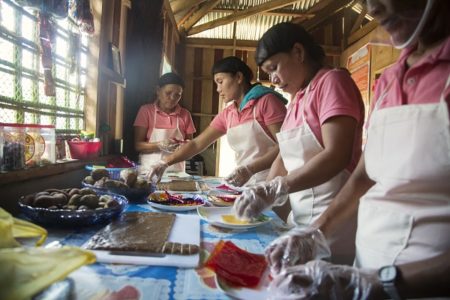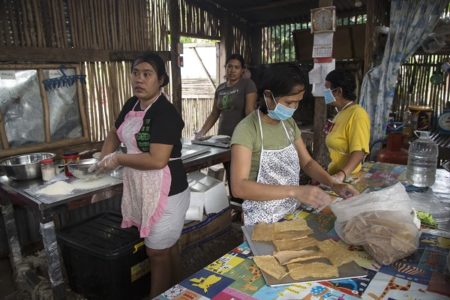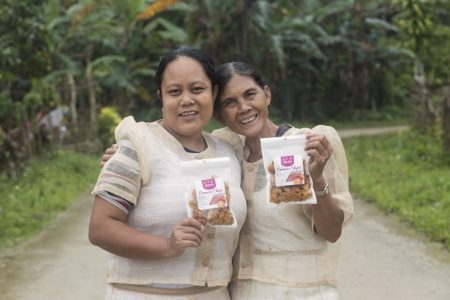
Rural Filipino farmers are reinventing themselves from smallholders to food-processing entrepreneurs through a participatory learning approach known as the Farmer Business School (FBS). Implemented by the International Potato Center’s (CIP) project on Food Resilience through Root and Tuber Crops in Upland and Coastal Communities of the Asia-Pacific (FoodSTART+), the FBS methodology deepens farmers’ understanding of value chains while providing the training they need to identify market opportunities, develop new product lines and launch their own businesses.
CIP Senior Research Associate, Arma Bertuso, shares insights on this innovative methodology.
How was the FBS approach first developed?
It was first developed by CIP in Indonesia in 2008 through an Australian Centre for International Agricultural Research-funded project to help farmers become entrepreneurs and link them to different actors along the value chain. It’s a combination of two approaches — the Farmer Field School model, which focuses on crop production, and the Participatory Market Chain Approach (PMCA), a platform for farmers to engage with different value chain actors. During the ten-month training, farmers conduct market assessments, identify commodities and products they can develop for sale, develop their own product lines from the raw materials and learn how to market and negotiate prices for those products. Each FBS group develops a business or enterprise they inaugurate on their graduation day which doubles as a business launch.
Why do farmers need to learn how to participate in the market, isn’t that something that they already know?
Actually, no. Farmers produce crops without the certainty that there is a market for their products. Traditionally, farmers have minimal business skills, no or limited access to markets, inadequate access to market information and mostly rely on middlemen to set the prices for their goods. Farmer Business School participants, however, learn about markets. “You taught us how to engage in the market, how to understand the market,” they tell us. The training helps them know where to market their product and how to negotiate better prices for that product. Through FBS, they have learned how to develop their product lines and add value to the crops/commodities they produce.

You work with farmers and fisherfolks in rural communities, how does the FBS approach benefit them?
Most of the farmers and fisherfolks we work with are smallholders located in remote areas, which can make it hard to get their fresh produce to market. Fresh roots can spoil anywhere from a few days to a few months after harvest, but if you develop product lines, it can extend the shelf-life of what they’ve grown, while adding value and generating additional income. Take for example our partner INREMP (Integrated Natural Resources and Environmental Management Project) which focuses on protecting watershed in a mountainous area of the Philippines. Can you imagine the transportation costs for a farmer in a remote area to transport 50 kilos of sweetpotato to sell at the market? If you teach farmers how to make value-added food products such as chips, beverages or jams, they won’t have to bring 50 kilos of sweetpotato to the market but rather finished products that also fetch them better prices.
The majority of FBS participants are women; how does this model help to empower female farmers?
Yes, 50 to 80 percent of our participants are women, depending on the group. I remember an interview with one FBS group of cassava producers where the women were saying, “We don’t expect thousands of pesos in income from what we are doing, but we are happy if we’re earning hundreds.” Before the FBS, they would rely on the husband to get money for their children’s expenses, but because earning even a little bit of money gives them the power to make some financial decisions within the family.

Why is the group aspect of the Farmer Business School so important?
When farmers work as a group, they have more power to negotiate than they do as individuals. By working and selling together they can produce in larger quantities which makes them more competitive in the open market.
How does FBS benefit both farmers and businesses?
We need to link farmers to other value chain stakeholders. In 2015, we conducted a roundtable discussion with private industry and businesses to identify their challenges. One of their primary needs was a consistent supply of the raw materials, particularly for root crops. When selling products to a business the volume and the consistency of supply are essential. For example, when supplying a supermarket, you can’t provide one hundred bags of chips the first month and then provide no stock the following month. FBS participants as a group might be able to supply that need for volume. We work on both ends of the value chain.
How is CIP working to mainstream this methodology?
CIP has been upscaling the FBS model in Asia through the Food Resilience Through Root and Tuber Crops in Upland and Coastal Communities of the Asia-Pacific (FoodSTART+) project and in the first phase of the project. We work with government agencies through International Food and Agricultural Development (IFAD) loan projects to help scale out and mainstream the FBS approach, and at the same time assist them in achieving some of their objectives such as economic resilience. During the first phase of FoodStart one IFAD loan project that started in 2012 with six FBS pilots that formed and launched businesses grew to almost 100 Farmer Business School groups by 2015. In our second phase as FoodSTART+, we are working through partners to implement the FBS methodology with four IFAD investment projects in India, Indonesia and Philippines. Beyond that other partners such as the Visayas State University have also adopted the FBS model and is currently implementing it with other non-governmental organizations to reach even more farmers.
Does the FBS model only work for root crops?
No, FBS is commodity neutral. It teaches farmers how to develop and innovate new products. We provide the training and show them the skills they need to succeed. It’s up to them to develop different products using the commodity we worked with or even expand to other commodities. In the Philippines, we work with root crops because they are essential against climate change and for food security, but FBS can be applied to other crops and products. Previous FBS participants in the Philippines have taken what they’ve learned and applied it to heirloom rice, cut flowers, handicrafts, even blacksmithing. The FBS has also been adapted into Aqua-based Business Schools to work with fisherfolk and their marine products.
Farmer Business Schools are being piloted in the Philippines, India, and Indonesia as part of the FoodSTART+ project with generous funding from the International Fund for Agricultural Development (IFAD) and the European Union.
